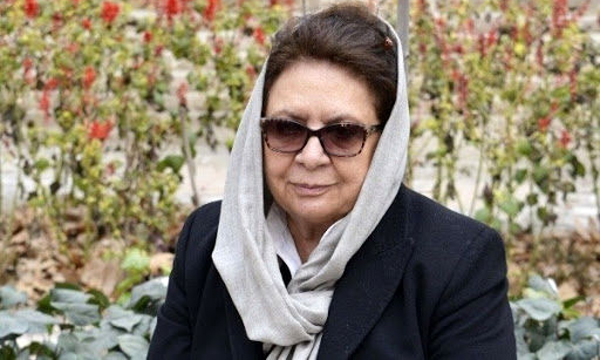
The first chapter of Goli Taraghi’s Two Worlds, “The First Day,” begins with the narrator finding herself stunned and silent at a psychiatric hospital, stuck with “destroyed people” and their “aged hands”. Resisting to communicate with her doctor, nurses, and other patients, she travels in her mind between Shemiran Garden (her childhood home back in Tehran with its trees and sculptures, with her father, mother, auntie Azar, neighbors, and lovers) and the hospital in Paris (her current residence with its grey walls, the echo of the church bell, and the sound of sirens).
For a reader who knows Taraghi from her nostalgic tone in Scattered Memories scrutinizing each and every detail of her childhood in old Tehran, this beginning is surprising: Where are the traces of that eloquent narrator who recalled her memories through descriptive and vivid images? How bitter is the silence of the story-teller who has no more lullabies to sing! However, her reticence and stillness begin to melt as her psychiatrist, knowing she is a writer, gives her a stack of papers and some pencils, encouraging her to write her mental journey out instead of keeping it to herself. After some initial reluctance, she begins to pour out, writing her dreams. Feeling more comfortable with the tools, she continues to write entire chapters, each narrating a momentous memory of her life back in Tehran, and finishes the book with “The Last Day”. There, the endeavor of healing the psyche through writing ends. She leaves the psychiatric hospital and returns to the ordinary life in which once again she has an appetite, makes a to-do list, and laughs at delicate gestures of children on the street. With the book finished, the narrator is reborn to the present moment which has been emancipated from the haunting past. She gets past the memory of homeland and the experience of exile and absorbs life as it flows.
***
Zohreh Taraghi- Moghadam, known as Goli Taraghi, is an Iranian short story writer and novelist. She is one of the most critically acclaimed woman writers in Iran. She has been awarded two Golshiri Awards for five of her short stories along with the Contre-Ciel Short Story Prize for another one, which should promote her literary reputation beyond Iranian borders. Taraghi was born in Tehran, Iran, in 1939. Her father, Lotfollah Taraghi, a member of parliament, a journalist and a publisher, was among the supporters of modernization in Iran through founding and publishing two successful journals, Progress (ترقی), and Young Asia (آسیای جوان). Taraghi gained her undergraduate degree in Philosophy from Drake University in the United States. Returning to Iran, she got her master’s degree from the University of Tehran and started to teach philosophy and the interpretation of myth and symbols there. She began to publish fiction with her 1969 collection of short stories, I too am Che Guevara (من هم چه گوارا هستم). After the 1979 revolution, which caused temporary closure of universities throughout 1980, she moved to Paris where she established her literary reputation and published some of her stories translated in French. However, she has continued visiting Tehran and publishing there, finding her homeland a rich source of literary inspiration.
Throughout her literary career, Taraghi has portrayed the life of Iranian characters before and after the revolution, focusing on the unfavorable omnipresence of this upheaval through experiencing war, immigration, exile, or alienation. However, she considers her work apolitical and rather philosophical. In an interview with KCRW’s Bookworm, she explains how her worldview has been shaped through her philosophical preoccupations combined with the poetic vantage point that her Iranian state of mind has been inherited from Iran’s classic poets. The outcome of this viewpoint is her obsession to delve into ordinary objects and everyday challenges in order to examine their primordial origins. This is how she narrates the literal world to reach the primordial one, portrays ordinary characters to symbolize their archetypal incarnations, and exhibits trivialities to highlight their eternal associations.
***
Having read the “double life” of Taraghi’s characters and how they are stuck in and affected by two worlds of being, in exile or in Iran for instance, it may seem confusing not to consider her work political. However, a more sophisticated look would reveal broader philosophical layers to discover. The narrator in the final chapter of Two Worlds quests for unification with the present moment through sensorial connections beyond all the socio-political upheavals that affected her past. Just like her, Taraghi narrates the influence of historical events on the lives of Iranian people not only to highlight politics but to ponder the underlying human-related concepts which are associated with or generate those events.
Biblio Brief
Short Story Collections
- I too am Che Guevera (من هم چه گوارا هستم). Tehran: Morvarid, 1969/ Niloufar, 2013.
- Scattered Memories (خاطره های پراکنده). Tehran: Bagh-e- Ayne, 1992/ Niloufar, 2002.
- Somewhere else (جایی دیگر). Tehran: Niloufar, 2000.
- Two Worlds (دو دنیا). Tehran: Niloufar, 1381, 2008.
- Another Opportunity (فرصت دوباره): Tehran: Niloufar, 2014.
Novels
- Winter Sleep (خواب زمستانی). Tehran: Agah, 1973/ Farzan-e-Rooz, 1997/ Niloufar, 2003.
Screenplays
- Bita (بیتا). Tehran.
The movie was directed by Hazir Dariush in 1972, Tehran.
- The Pear Tree (درخت گلابی). Tehran: Ketabsara, 2009.
Based on Taraghi’s short story of the same name, the screenplay was co- written with Dariush Mehrjui and directed by him in 1998.
Translations
- Savage Carlson, Natalie. The Family Under the Bridge (خانواده زیر پل). Trans. Goli Taraghi. Tehran: Elmi Farhangi Publishing Co., 1999.
Collection of Essays
- The Grand Lady of Existence: Myth, Symbol, and Archetypes (بزرگ بانوی هستی: اسطوره، نماد، صور ازلی), Tehran: Niloufar, 2007.
Poetry (Children)
- Darya Pari, Kakol Zari (دریا پری، کاکل زری). Tehran: Farzan-e-Rooz, 1999.
Publications in English
- Winter Sleep. Trans. Francine T. Mahak. California: Mazda Publishers, 1994.
- A Mansion in the Sky: And Other Short Stories. Trans. Faridoun Farrokh. Austin: The University of Texas Centre for Middle Eastern Studies, 2003.
- “The Wolf Lady”. Another Sea, Another Shore: Persian Stories of Migration. Trans & Ed. Shouleh vatanabadi & Mohammad Mehdi Khorrami. Northampton: Interlink Publishing Group, 2004.
- “The unfinished game”. Words Without Borders: The World Through the Eyes of Writers: An Anthology. Trans. Zara Houshmand. New York: Anchor Books, 2007.
- The Pomegranate Lady and Her Sons. Trans. Sara Khalili. New York: W.W. Norton & Company, Inc., 2013.


Leave a Reply